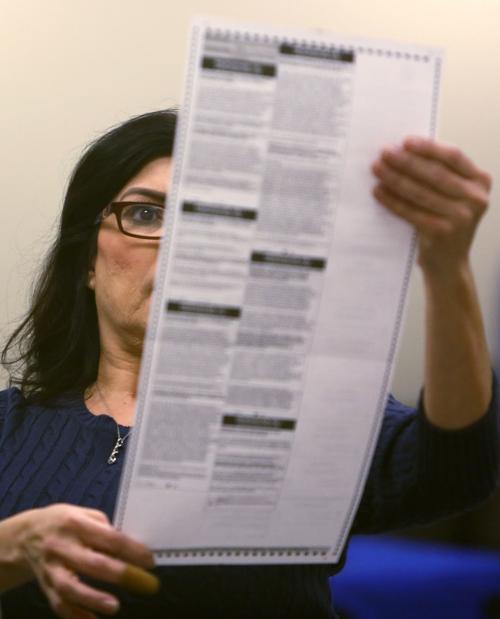The Democratic Party is entitled to challenge an Arizona law that results in GOP candidates being listed first on most ballots, a court ruled Friday.
A three-judge panel of the 9th Circuit Court of Appeals said there is reason to believe the system, established by the Republican-controlled Legislature, is unconstitutional.
The judges cited the fact that in the 2020 general election, 82% of Arizonans got ballots that listed Republican candidates first.
And the challengers presented evidence that whichever candidate is listed first has an inherent advantage, said Judge Jed Rakoff, writing for the court.
Friday’s ruling does not overturn the 1979 law. But it sends the case back to U.S. District Court Judge Diane Humetewa in Phoenix, who threw it out last year.
She said at the time it was not the job of federal courts to decide that the system is unfair, nor that the solution proposed by challengers — rotating the ballot positions of Democrats and Republicans — is any better.
No date has been set for that hearing. But even if Humetewa ultimately sides with the challengers, it’s not clear that any change can be made in time for the November election.
Under the current system, candidates in primary elections have the position of their names on the ballot rotated among various precincts, so no one person gets a built-in advantage.
But when the general election comes around, candidates are listed on ballots in each county based on how well each party’s gubernatorial hopefuls did in that county in the last election.
That means that this year the Republicans for all offices will be listed ahead of Democrats in all races in 11 of the 15 counties where Republican Gov. Doug Ducey outpolled Democrat David Garcia four years ago. That includes Maricopa County, which has more voters than the other 15 counties combined.
Democrats sued, arguing that, all else being equal, there is a tendency of voters to choose the first candidate on a list.
The party cited data from Jonathan Rodden, a political science professor at Stanford University.
He estimated that first-listed candidates get an advantage average of 2.2 percentage points. That can reach 5.6 percentage points, Rodden said.
Those kind of numbers can make all the difference in close races.
In the 2020 race for U.S. Senate, the margin of victory for Democrat Mark Kelly over Republican Martha McSally was 2.3%.
In the presidential race, there was a difference of just 0.3% between Joe Biden and Donald Trump.
The 9th Circuit’s Rakoff said there is a legitimate reason for federal courts to look at such regulations.
“As a practical matter, there must be a substantial regulation of elections if they are to be fair and honest and if some sort of order, rather than chaos, is to accompany the democratic process,’’ he wrote, quoting an earlier U.S. Supreme Court decision.
Rakoff said the idea of rotating the names of candidates is hardly a radical idea. As far back as 1958 the Arizona Supreme Court, considering the question of how to list the names of candidates when machines are used, found that it was a “well-known fact that where there are a number of candidates for the same office, the names appearing at the head of the list have a distinct advantage,” he said.
In her ruling, Humetewa had questioned whether the Democratic National Committee and other Democrats had a right to sue. She said challengers could not show harms caused by the law.
“They do not argue that the ballot order statute prevents them from casting a ballot for their intended candidate, nor do they argue that their lawfully cast votes will not be counted,’’ Humetewa wrote.
She brushed aside arguments that some people were having their votes for their candidates diluted because others were simply picking the first name they saw.
“Plaintiffs will not be injured because other voters may act ‘irrationally’ in the ballot box by exercising their right to choose the first-listed candidate,’’ Humetewa wrote.





